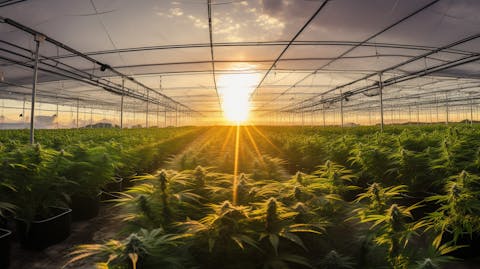In this article, we will discuss the 7 Best Vertical Farming and Hydroponic Stocks to Buy.
The agriculture sector has always been crucial to both the global economy and everyday life. However, to meet rising food demands, harmful farming practices have been widely adopted, contributing to climate change, deforestation, and soil degradation. As a result, sustainable and eco-friendly farming innovations have become essential. Vertical and hydroponic farming are two such innovations, offering environmentally friendly and efficient methods for producing crops in a way that reduces the strain on the planet.
Sector Performance
The broader market had a strong performance in 2024, largely driven by technology stocks in the first half, resulting in a roughly 18.0% year-to-date (YTD) increase. However, future performance remains uncertain due to ongoing market volatility.
In 2022, inflationary pressures in the U.S. reached a peak, fueled by rising input costs for energy, transportation, and labor. Since then, inflation has gradually decreased, providing relief for businesses across sectors. Inflation continues to ease as the annual inflation rate slowed for a fifth consecutive month to 2.5% in August 2024, the lowest since February 2021. This has led to lower costs associated with these essential elements of vertical farming, improving margins. Additionally, lower energy costs due to reduced inflation can make hydroponic and vertical farming more financially sustainable, as these farms rely heavily on controlled environments.
Overall, food and farming companies are still grappling with the lingering effects of inflation, particularly elevated commodity prices, as the farm products sector has underperformed with a 7.0% YTD decline.
That said, the shift toward more “value-driven” consumer spending could boost demand for vertical farming produce. As consumers look for affordable, fresh, and local food sources, vertical farms can offer year-round, sustainably grown produce with minimal transportation costs, making it a competitive option in a price-sensitive market.
Vertical Farming & Hydroponic Market
Vertical farming involves growing crops on vertical surfaces instead of traditional horizontal fields. By using vertically stacked layers, farmers can produce more food in the same or even less space. Often, vertical farms are incorporated into structures like greenhouses or skyscrapers. Hydroponics, a soil-free method of growing plants using water and nutrients, is a highly efficient approach that uses less space and water than traditional farming. According to Markets and Markets, the global vertical farming market is projected to grow from $5.1 billion in 2023 to $15.3 billion by 2028, with a CAGR of 24.7%.
A new study from the U.S. Department of Agriculture (USDA) and Virginia Tech suggests that technologies like controlled environment agriculture and agrivoltaics may play a key role in the future of farming. Researchers highlight that these innovative approaches could boost yields, improve nutrition, enhance access to local foods, and provide better year-round availability of fresh produce compared to traditional large-scale outdoor farming.
Between 2009 and 2019, the number of controlled environment agriculture operations in the U.S. more than doubled to nearly 3,000, with crop production increasing by 56%, rising from 502 million pounds to 786 million pounds. By 2019, over 60% of tomatoes, cucumbers, and lettuce in controlled environments were grown using hydroponics.
As of 2021, most of the approximately 300 agrivoltaics sites were solar farms with pollinator-friendly vegetation. Around 35 of these sites combined solar panels with vegetation grazed by sheep, while few included specialty crops like blueberries.
Challenges in Vertical Farming
Vertical farming faces challenges like high energy costs and labor expenses, leading to the failure of many ventures. However, advancements in technology have begun to address these issues, making vertical farms more viable. A prime example is Bowery Farming, founded in 2015 by Irving Fain in New York. Bowery produces a variety of fruits and vegetables in smart indoor farms located within 200 miles of major cities, using technology to automate and optimize the entire value chain.
As such, we have compiled a list of some of the best vertical farming and hydroponic stocks to buy today since they may well skyrocket sometime in the near future.

A cannabis-growing operation in a large, industrial greenhouse.
Methodology
For this list, we scanned Insider Monkey’s Q2 2024 database and selected companies involved in the Vertical Farming and Hydroponic industry, focusing on areas relevant to sustainable agriculture and innovative farming technologies. We picked seven companies with strong balance sheets and solid financials and ranked them in ascending order of hedge funds having stakes in them. For stocks with the equal number of hedge fund holders, we used their upside as the tiebreaker.
Why are we interested in the stocks that hedge funds pile into? The reason is simple: our research has shown that we can outperform the market by imitating the top stock picks of the best hedge funds. Our quarterly newsletter’s strategy selects 14 small-cap and large-cap stocks every quarter and has returned 275% since May 2014, beating its benchmark by 150 percentage points (see more details here).
7. urban-gro, Inc. (NASDAQ:UGRO)
Number of Hedge Fund Holders: 2
urban-gro, Inc. (NASDAQ:UGRO) is an agricultural technology systems integrator. The company offers comprehensive design and expertise in climate control, automated fertigation and irrigation, lighting, environmental and water treatment, and integrated pest management solutions to the medical and recreational cannabis industries in legalized states.
In Q1 2024, urban-gro, Inc. (NASDAQ:UGRO) reported $15.5 million in revenue, a 4% sequential increase but a 7% year-over-year (YoY) decline due to reduced activity in the construction design-build and equipment systems sectors. Despite this, gross profit margins rose to 20%, from 17% the previous year, reflecting better cost management and a higher-margin project mix. The company also cut operating expenses by $2.7 million, significantly improving its bottom line. Net loss narrowed to $2.1 million, down from $5.1 million in Q1 2023, with adjusted EBITDA improving by $3.1 million.
More importantly, urban-gro, Inc. (NASDAQ:UGRO) ended Q1 with $0.7 million in cash and a $2.0 million balance on its working capital line of credit. The $10 million credit line, secured in December, offers the company financial flexibility without the need to raise additional dilutive capital. Thus, limited cash available and the unprofitable nature of the company are factors that investors must keep an eye out on.
Nevertheless, in June 2024, urban-gro, Inc. (NASDAQ:UGRO) announced new contracts with over a dozen cannabis clients, focusing on engineering, architecture, design, equipment procurement, and construction management for cultivation facilities and dispensaries. These contracts aim to support the growth of cannabis operators through tailored infrastructure solutions. The contract revenue to be generated from this totals $12 million, which the company expects to realize by Q3 2024.
In terms of stock performance, urban-gro saw a 17.39% rise over the past month and a 4.53% gain year-to-date (YTD). This increase is attributed to improved Q1 financials and the potential rescheduling of cannabis to Schedule III, which would benefit the company’s cannabis infrastructure business.
Notably, while urban-gro, Inc. (NASDAQ:UGRO) shows strong potential, it faces regulatory uncertainties in the cannabis sector and competition. Additionally, limited cash reserves and reliance on credit lines pose potential liquidity risks if revenue targets or project timelines are not met.
As of Q2 2024, two hedge funds, with a combined investment of $98,000, are bullish on the stock, according to Insider Monkey’s database, earning urban-gro a spot on the list of the best agriculture stocks to buy.
6. iPower Inc. (NASDAQ:IPW)
Number of Hedge Fund Holders: 3
iPower Inc. (NASDAQ:IPW) is a tech-driven online retailer specializing in consumer home, pet, and garden products, along with offering value-added e-commerce services for third-party brands and products. The company provides a range of products, including grow light systems, advanced HVAC systems, water pumps, fertilizer delivery systems, and various growing media such as soil, rock wool, and coconut fiber.
In Q3 2024, iPower Inc. (NASDAQ:IPW) saw a total revenue rise of 15% YoY to $23.3 million, driven by higher product sales to its largest channel partner and growth in its super suite supply chain business. Gross profit jumped 41% to $10.9 million, with gross margins reaching a record 47%, thanks to improved pricing and a favorable product mix.
Furthermore, operating expenses slightly decreased, improving to 40.1% of revenue, demonstrating strong operational leverage. Most importantly, net income turned positive at $1 million, up from a loss of $1.5 million in the same period last year, while adjusted net income reached $1.6 million, marking a significant turnaround in profitability.
iPower Inc. (NASDAQ:IPW)’s cash stood at $2.7 million as of March 31, 2024, down from $3.7 million in June 2023. Despite this, the company improved its liquidity by reducing net debt by 59%, enhancing its financial stability and future growth prospects.
On June 20, iPower Inc. (NASDAQ:IPW) announced a new manufacturing partnership in Vietnam, aiming to strengthen the company’s supply chain, enhance efficiency (through cost advantage), and diversify risks, positioning iPower for competitive pricing and future growth.
In terms of price movement, iPower saw an upsurge of 2.86% over the past month and a staggering 220.00% YTD, reflecting investor confidence. With a strong demand pipeline, supply chain improvements, and expansion into new e-commerce platforms like Tmall, the company is well-positioned for continued growth and further stock price upside.
Notably, investors should consider iPower’s relatively modest revenue growth forecast of 3.2% for the coming year, which falls below the industry average of 5.3%. This slower growth, combined with the company’s reliance on key channel partners, may limit its ability to sustain current stock price momentum.
Analysts project an upside price potential of 90.97%, and as of Q2 2024, 3 hedge funds, holding a combined investment of $3.2 million, are bullish on the stock, according to Insider Monkey’s database. Hence, IPW makes it to our list of the best agriculture stocks to buy now.
5. Edible Garden AG Incorporated (NASDAQ:EDBL)
Number of Hedge Fund Holders: 3
Edible Garden AG Incorporated (NASDAQ:EDBL) is a leader in controlled environment agriculture (CEA), offering locally grown, organic, and sustainable produce. Available in over 5,000 U.S. stores, the company is innovating CEA with sustainable packaging, safety-in-farming protocols, and patented technologies like GreenThumb software and self-watering displays. Edible Garden operates advanced greenhouses and facilities in New Jersey and Michigan, alongside a network of contract growers near major U.S. markets.
In Q2 2024, Edible Garden AG Incorporated (NASDAQ:EDBL) reported $4.2 million in revenue, a slight YoY increase driven by core products like cut herbs and vitamin supplements. The company’s strategic exit from lower-margin products, such as the floral segment, contributed to a more disciplined approach. A 37% drop in the cost of goods sold and a shift away from third-party growers boosted gross profit by 157%. Despite these improvements, net losses remained high due to increased interest expenses and one-time charges related to debt extinguishment.
Additionally, Edible Garden AG Incorporated (NASDAQ:EDBL) faces liquidity challenges, with $2.188 million in cash as of June 30, up from $510,000 in December 2023. The company used $5.649 million in cash for operations in the first half of 2024 and has a working capital deficit of $2.315 million. To address this, the company raised $6 million through public equity offerings and is focusing on cost-saving measures to improve cash flow.
Edible Garden AG’s stock decline of 28.37% in the past month and 89.96% YTD is driven by inflation, rising interest rates, and liquidity concerns. Additionally, supply chain constraints and higher input costs have pressured margins, which, combined with the company’s reliance on external financing, may have contributed to the negative sentiment surrounding the stock.
However, with streamlined operations, expanding product lines, and partnerships like UNFI, Edible Garden AG Incorporated (NASDAQ:EDBL) is positioned for future growth and potential positive cash flow. On September 9, the company announced its participation in ECRM’s Vitamin and Sports Nutrition Session to showcase its Kick Sports Nutrition line, aiming to expand visibility and business opportunities with health-conscious athletes through 1-on-1 meetings with buyers.
As of Q2 2024, three hedge funds, with a combined investment of $0.3 million, are bullish on the stock, according to Insider Monkey’s database, earning it a place on our list of the best vertical farming and hydroponic stocks to buy.





